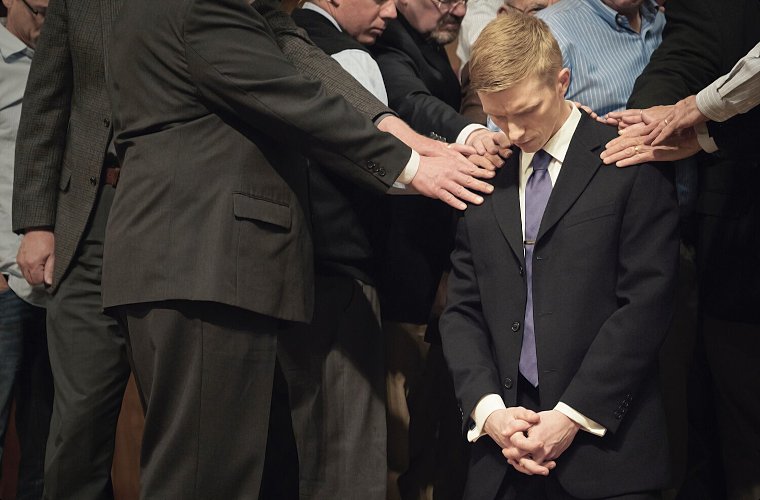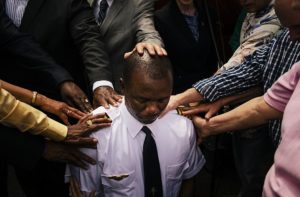This is a trustworthy saying: “If someone aspires to be an elder, he desires an honorable position.” So, an elder must be a man whose life is above reproach. He must be faithful to his wife. He must exercise self-control, live wisely, and have a good reputation. He must enjoy having guests in his home, and he must be able to teach. He must not be a heavy drinker or be violent. He must be gentle, not quarrelsome, and not love money. He must manage his own family well, having children who respect and obey him. For if a man cannot manage his own household, how can he take care of God’s church? An elder must not be a new believer, because he might become proud, and the devil would cause him to fall. Also, people outside the church must speak well of him so that he will not be disgraced and fall into the devil’s trap.
In the same way, deacons must be well respected and have integrity. They must not be heavy drinkers or dishonest with money. They must be committed to the mystery of the faith now revealed and must live with a clear conscience. Before they are appointed as deacons, let them be closely examined. If they pass the test, then let them serve as deacons. In the same way, their wives must be respected and must not slander others. They must exercise self-control and be faithful in everything they do. A deacon must be faithful to his wife, and he must manage his children and household well. Those who do well as deacons will be rewarded with respect from others and will have increased confidence in their faith in Christ Jesus.
“I am writing these things to you now, even though I hope to be with you soon, so that if I am delayed, you will know how people must conduct themselves in the household of God. This is the church of the living God, which is the pillar and foundation of the truth. Without question, this is the great mystery of our faith: Christ was revealed in a human body and vindicated by the Spirit. He was seen by angels and announced to the nations. He was believed in throughout the world and taken to heaven in glory”. 1 Timothy 3:14-16 NLT
“I left you on the island of Crete so you could complete our work there and appoint elders in each town as I instructed you. An elder must live a blameless life. He must be faithful to his wife, and his children must be believers who don’t have a reputation for being wild or rebellious. An elder is a manager of God’s household, so he must live a blameless life. He must not be arrogant or quick-tempered; he must not be a heavy drinker, violent, or dishonest with money. Rather, he must enjoy having guests in his home, and he must love what is good. He must live wisely and be just. He must live a devout and disciplined life. He must have a strong belief in the trustworthy message he was taught; then he will be able to encourage others with wholesome teaching and show those who oppose it where they are wrong.” Titus 1:5-9 NLT
In the above scriptures, there are thirteen characteristics that apply to Elders and nine which apply to Elders and Deacons, plus two that apply to Deacons only. However, I believe that to become an Elder you first need to prove yourself in the Church doing the work of a Deacon so all of these characteristics listed will apply to Eldership. These requirements are all about the character of the Elder. Sometimes Churches have other requirements for Eldership. Some are not scriptural and some are rules that have been made as a result of experience and are not necessarily unscriptural. For example, a Church may require an Elder to have completed certain studies. In the time of the Bible, there were no Bible Colleges. 2 Timothy 2:15 says study to show yourself approved to God, a workman that does not need to be ashamed, rightly dividing the word of truth.
So, an Elder must have studied the Word and be able to apply it. It is not always necessary to have studied formally to be approved, but it makes it easier and also shows a common theology and the doctrines that come from it.
Finally, the whole process should be bathed in prayer every step of the way. If God is truly calling a man to preach, He will confirm it in many ways. Seek His face and ask that doors are opened to more opportunities and more confirmations, both internal and external. Ask also that doors will close if it is not His will to continue. Take heart in the fact that God is sovereignly in control of all things, and will work “all things . . . together for good to those who love God, to those who are the called according to His purpose” Romans 8:28. If He has called you, that call will not be denied. We are not all called to preach, but we are all called and should be able to teach.
Ordination
A formal process of confirming a calling and equipping through some form of specialized training, through a ceremony which may also include anointing with oil, prayer, and laying on of hands, by a specific group of believers, according to the agreed upon standards of their group. The modern definition of ordination is “the investiture of clergy” or “the act of granting pastoral authority or sacerdotal power (Priestly or the office of Priest, characterized by belief in the divine authority of priesthood)” This stems from the pre-reformation Church and is still an integral part of Roman Catholicism. A priest is the representation of God to man and man to God. Please note that all believers are Priests under the New Covenant. Usually, an ordination service is a ceremony in which someone is commissioned or appointed to a pastoral position within the church. Usually, the ceremony involves the laying on of hands.
However, the biblical definition is a little different. The word ordain in the Bible refers to a setting in place or designation.
Acts of the Apostles 7:10 NLT and rescued him from all his troubles. And God gave him favour before Pharaoh, king of Egypt. God also gave Joseph unusual wisdom, so that Pharaoh appointed him governor over all of Egypt and put him in charge of the palace.
Joseph was “ordained” as a ruler in Egypt.
Matthew 24:45 NLT “A faithful, sensible servant is one to whom the master can give the responsibility of managing his other household servants and feeding them.
The steward in Jesus’ parable was “ordained” to oversee a household.
Acts of the Apostles 6:1-6 NLT but as the believers rapidly multiplied, there were rumblings of discontent. The Greek-speaking believers complained about the Hebrew-speaking believers, saying that their widows were being discriminated against in the daily distribution of food. So, the Twelve called a meeting of all the believers. They said, “We apostles should spend our time teaching the word of God, not running a food program. And so, brothers, select seven men who are well respected and are full of the Spirit and wisdom. We will give them this responsibility.
Then we apostles can spend our time in prayer and teaching the word.” Everyone liked this idea, and they chose the following: Stephen (a man full of faith and the Holy Spirit), Philip, Procorus, Nicanor, Timon, Parmenas, and Nicolas of Antioch (an earlier convert to the Jewish faith). These seven were presented to the apostles, who prayed for them as they laid their hands on them.
Deacons were “ordained” to serve the Jerusalem church.
Titus 1:5 NLT I left you on the island of Crete so you could complete our work there and appoint elders in each town as I instructed you.
Elders were “ordained” in each city in Crete. In none of these cases is the mode of ordination specified, nor is any ceremony detailed; the “ordinations” are simply appointments by men, often confirming an appointment by God. The word can even be used negatively, as an appointment to punishment (Luke 12:46).
Acts 20:28 NLT “so guard yourselves and God’s people. Feed and shepherd God’s flock—his church, purchased with his own blood —over which the Holy Spirit has appointed you as elders.”
(Acts 13) includes a good example of a ministerial appointment: “While they were worshipping the Lord and fasting, the Holy Spirit said, ‘Set apart for me Barnabas and Saul for the work to which I have called them.’ So, after they had fasted and prayed, they placed their hands on them and sent them off. The two of them, sent on their way by the Holy Spirit, went down to Seleucia” (vv. 2-4).
In this passage, we note some key facts:
- It is God Himself who calls the men to the ministry and qualifies them with gifts.
- The members of the church recognize God’s clear leading and embrace it.
- With prayer and fasting, the church lays hands on Paul and Barnabas to demonstrate their commissioning.
- God works through the church, as both the church and the Spirit are said to “send” the missionaries.
- Paul regularly ordained pastors for the churches he planted. He and Barnabas directed the appointment or ordination of elders “in each church” in Galatia (Acts 14:23). He instructed Titus to “appoint elders in every town” on Crete (Titus 1:5). Titus himself had been ordained earlier, when “he was chosen by the churches” (2 Corinthians 8:19). In the above passages, the ordination of elders involves the whole congregation, not just the apostles. The Greek word used in 2 Corinthians 8:19 for Titus’s appointment, and in Acts 14:23 for the choosing of the Galatian elders, literally means “to stretch forth the hands.” It was a word normally used for the act of voting in the Athenian legislature. Thus, the ordination of church leaders involved a general consensus in the church, if not an official vote. The apostles and the congregations knew whom the Spirit had chosen, and they responded by placing those men in leadership.
- When God calls and qualifies a man for the ministry, it will be apparent both to that man and to the rest of the church. The would-be minister will meet the qualifications set forth in 1 Timothy 3:1-16 and Titus 1:5-9, and he will possess a consuming desire to preach (1 Corinthians 9:16). It is the duty of the church elders, together with the congregation, to recognize and accept the calling. After that, a formal commissioning ceremony—an ordination service—is appropriate, though by no means mandatory. The ordination ceremony itself does not confer any special power; it simply gives public recognition to God’s choice of leadership. Ordination is the recognition of God’s calling and anointing of someone by the Church leadership. Modern ordination is usually only for leadership positions and is usually in a service and the ordained is certified. It is often difficult, if not impossible for someone to be effective in ministry in some groups if they are not ordained.







